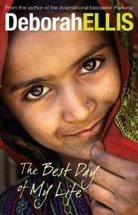The best day of my life by Deborah Ellis

Allen and Unwin, 2012. ISBN 97874237 914 2.
(Ages: 11+) Recommended. Leprosy. When Valli learns that her aunt
and uncle are not her relatives but someone to whom money was paid
to take her in, she decides to leave. Their life is dependent upon
the town's coal mine, the children collecting pieces that have
fallen along the roadside to make a pittance to give to the family
for food. Hearing they are not related she climbs aboard one of the
trucks leaving the town. In turn the driver finds her ad takes her
to a place he knows where young girls are wanted, but when they wash
her and realise that she cannot feel the burns on her feet, they
toss her out and she must fend for herself. Valli has leprosy and
Deborah Ellis is again at her knowledgable best in relating an
engrossing story which also informs and educates.
Surviving on the streets in Kolkata means sleeping where she can,
begging a few pence for food, and stealing or borrowing what she
needs. A doctor meets her and seeing the state of her feet takes her
to her hospital where she can receive treatment. But once Valli
notices the others with stumpy fingers and pieces of their noses
gone, she runs off. When she comes to a decision to accept the
disease, she returns, finding that she can be cured.
At the end of the book is a sound glossary giving the readers the
meanings of some of the Indian words used, and the author's note
acquaints the readers with the facts of this disease, still much
prevalent in poorer areas of the world where the germ can spread
more easily because of overcrowding and poor diet. Ellis' work
always brings a dignity to the children she talks about, whether
they be in Pakistan, Bolivia or Afghanistan, and the story will
ensure that the book is read and read again.
Fran Knight